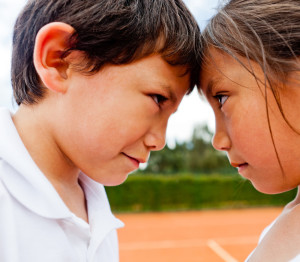
The thirtyish-year-old father stood next to me on the playing field. We were watching his four-year-old son’s soccer team.
“I can’t wait until Josh is old enough to play catch with me,” he said.
“Josh is old enough to play catch with you now. Matter of fact, if you don’t build that relationship now, when he’s six or seven he’ll choose his friends over you,” I said. “When did your dad start throwing balls to you?”
April. We are in the middle of team sports—soccer, t-ball, softball, baseball, track. The trend nationwide seems to involve children as young as three or four in little-league clubs.
Why? Why do we feel that it’s important for preschoolers to be involved in a team sport?
Are team sports the right thing for our under-sixes?
Competition seems to mean, “to win” and that the most important result of competing is winning. The structure of team sports creates “winners” and “losers”.
The word competition derives from the Latin, com, meaning with, and petere, to strive. To strive with others or to strive together. With competition, we become competent. Sports evolved from a desire or need to stay physically fit. There is nothing like signing up for a 10 K event with friends to help you roll out of bed for a 6 a.m. run.
What quality are we striving together in today’s team sports? What is our common goal?
If it is only to accrue points and declare one group winners and another group losers, we fail our children.
Is our objective to learn to work together as a team?
Is it to learn to take direction from a coach?
Is it to learn to be gracious whether we win or lose, understanding that unless we have competitors, we cannot claim the title of winner?
Winning status is conferred on us by those who compete against us. Winning is bestowed by those who strive with us toward common goals. A true competitor understands this. If our common goal is to stay physically fit and active, we should realize that we work harder because of our competitors, win or lose, fast or slow, junior or varsity.
Our preschoolers are in a developmental period of self-mastery along with developing independence and concentration.
Do our team sports for children under the age of six or seven aid this development?
Most of my observations tell me no.
Many of our preschoolers are attending team practices and games when these children’s needs could be better served by kicking and dribbling a soccer ball in their own backyard or in a park with parents or siblings. In a Costa Rican park I observed a lone three-year-old boy dribble and juggle a soccer ball for almost an hour. I lost concentration before he did.
Preschoolers need to be working on skills that promote self-mastery, independence and concentration. Around age six, children begin a developmental period where they enjoy and require group interaction and team-building.
Let’s give our preschoolers the time to develop close family relationships, master individual skills, develop physical and mental independence while acquiring strong focus doing age appropriate activities.
When our children, around age six or seven, are ready and ask to compete and work in a team, they will bring these foundational skills, strong relationships, self-reliance and concentration to their activities. Until then, let’s allow kids to be kids.


Thanks for posting on this topic. I feel there is a social pressure to sign kids up to play with a fear that if they aren’t involved in preschool, they won’t be able to keep up with their peers. The way you break this topic down helps me see the issue more clearly: it’s not about keeping up but what’s developmental appropriate for preschoolers to focus on.